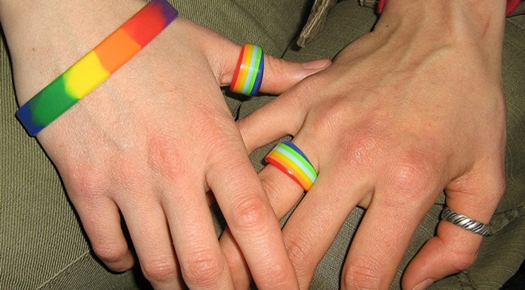
Photo Credits: Wikimedia
Late last month on October 22nd, a law extending marriage equality took effect in Northern Ireland. Many gay couples were delighted.
“What a day to be gay in Northern Ireland,” said Milnes, 29. “What a day to see history happen. It’s just a phenomenal feeling knowing that I will marry Christina, the love of my life, and celebrate until our feet can’t hold us up any longer.”
“You don’t grow up saying ‘I can’t wait to have a civil partnership’,” said Cara McCann, director of Here NI, a charity that advocates for lesbian and bisexual women. “You grow up saying ‘I want to be married’. They’re different things.”
Now, the first billboards advertising legal same-sex marriages have been erected across Belfast by Northern Ireland Humanists, marking the traditionally conservative country’s groundbreaking progress towards an inclusive, tolerant society.
The billboards feature pictures of same-sex couples with the words ‘Love wins for everyone’, and promotes Northern Ireland Humanists’ bespoke, meaningful, non-religious wedding ceremonies, which are conducted by its highly trained network of celebrants.
Northern Ireland Humanists Coordinator Boyd Sleator said: ‘LGBT people in Northern Ireland have suffered for too long under archaic laws influenced by religious groups which have prevented same-sex couples from being able to legally marry. Marriage is a fundamental human right and these billboards celebrate equality, fairness, and the enormous progress that we’ve achieved.
‘From next year, same-sex couples will be able to legally wed the person they love, and we hope people will choose a bespoke, humanist wedding to mark their special day.’
England and Wales enshrined marriage equality in 2013, followed by the Republic of Ireland in 2015. Opinion polls showed a big majority favored same-sex marriage in Northern Ireland, but the Democratic Unionist party (DUP) blocked change at the Stormont assembly.
Then in 2017, a dispute between the DUP and Sinn Féin collapsed the assembly, creating a vacuum. MPs at Westminster stepped in by passing an amendment in July by a backbench Labour MP, Conor McGinn, extending marriage equality to Northern Ireland.
The murder in April of Lyra McKee, a writer and LGBTQ activist who was planning to marry her partner, Sara Canning, channelled grief into demands for change
Monday was the last chance for opponents of change to restore Stormont and avert the legislation. The DUP and others attempted a recall to block the extension of abortion rights – a far more contentious change – but the effort failed, allowing liberalization of both marriage equality and abortion rights.
